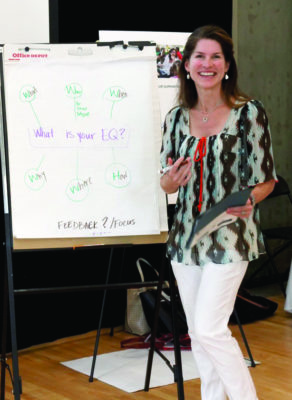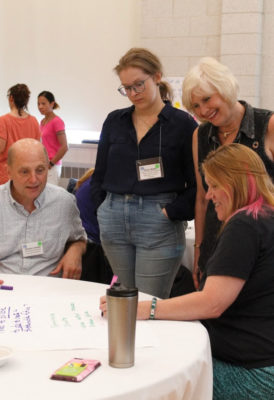
Founded in 2003 by Chappaqua resident Katie Ginsberg, the CELF Institute’s mission is to make Education for Sustainability (EfS) an integral part of every school’s curricula and culture. The non-profit has worked with students and teachers from kindergarten through high school and in all types of public and private schools in urban, suburban and rural settings. Since its inception, CELF has worked with more than 8,000 teachers and school leaders and more than 800,000 students from 2,800 schools.
A former advertising executive, Ginsberg never thought that she would one day lead an award-winning sustainability education non-profit. Working on consumer campaigns for global clients such as Unilever, Ginsberg had first-hand exposure to product manufacturing and the research and development process. It was motherhood that ultimately spurred her though to become a dedicated environmentalist. “Having three children, I began to really pay attention to ingredients and what I was feeding them, washing them with and putting on their skin.”
Ginsberg’s ‘aha moment’ that inspired a career change came after her son came home excited from celebrating Earth Day at Grafflin Elementary School many years ago. They had interactive sessions and he went around investigating dripping faucets.

Ginsberg spent two years researching other environmental non-profits in other countries such as the U.K., Australia and Japan before starting CELF. The first CELF Summer Institute was held in 2005 with approximately 30 attendees. Ginsberg finds it very gratifying that the CELF Summer Institute has doubled in the number of attendees and now several teachers are coming with their administrators in groups so that they can truly embody the theme of the conference–“activating change” on a school-wide basis.
This year’s CELF Summer Institute had notable presenters such as former New York Times science reporter Andrew Revkin and Steve Kaagan of Climate Interactive, a Washington D.C.-based company that addresses climate change and related issues like energy, water, food, and disaster risk reduction.
Joseph Montouri, a CELF Institute attendee and a Social Studies teacher at Horace Greeley High School always considered himself an environmentalist. “I wanted to integrate environmental learning into my social studies teaching so I developed a public policy course at Greeley through the lens of sustainability. So much of what we do as social studies teachers is focus on the past without any connection to the present,” he commented.
Montouri is hoping to create a “sustainability house” in the newly redesigned L-building at Greeley, which is currently undergoing renovation and reconfiguration. “This would be a school within a school taught by a team of teachers emphasizing sustainability and the three Es– economy, ecology and equity.”
The concept of the “sustainability house” has been presented to faculty, students and parents and it was accepted as one of the uses of the new space. By attending the CELF Institute, Montouri felt that he was equipped with ideas about how to move the project forward.
“Our goal is to prepare these educators who are with these students five days a week for most of the year to have the skills, knowledge and tools to not only teach about sustainability but ultimately enable their students to do something about it and that the situation is not hopeless. The good news is that there’s much more interest and demand from schools for this type of learning than ever before,” explained Ginsberg.
